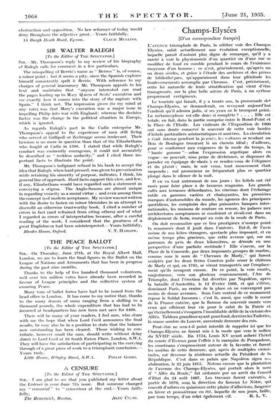SIR WALTER RALEGH
[To the Editor of THE SPECTATOR.] SIR,—Mr. Thompson's reply to my review of his biography of Ralegh calls for comment in a few particulars.
The misspelling of Berrio's name as Berreo " is, of course, a minor point ; but it seems a pity, since the Spanish explorer himself consistently spelt it Berrio. With reference to my charges of general inaccuracy Mr. Thompson appeals to his text and maintains that "anyone interested can read the pages leading up to Mary Qieen of Scots' execution and cce exactly how it comes into the story of the rupture with Spain." I think not. The impression given (to my mind at any rate) was that Mary's execution was a major issue in impelling Philip into war with England; whereas the decisive factor was the change in the political situation in Europe, which is ignored.
As regards Ralegh's part in the Cadiz enterprise Mr. Thompson's appeal to the experience of men still living who served at Gallipoli or Zeebrugge seems irrelevant. Their heroism is no more in question than that of the Elizabethans who fought at Cadiz in 1596. I stated that while Ralegh's conduct was eminently courageous, it could not accurately be described as reckless audacity," and I cited three im- portant facts to illustrate the point.
Mr. Thompson's indignant refusal in his book to accept the idea that Ralegh, when hard pressed, was given to prevarication while retaining his sincerity of purpose, indicates, I think, his general line of approach. Hard facts support this view, and few, if any, Elizabethans would have regarded such a statement as conveying a stigma. The Anglo-Saxons are almost unique in regarding veracity as a moral virtue ; and even among them the concept is of modern acceptance. My review was not written with the desire to fasten on minor blemishes in an attempt to discredit an otherwise trustworthy book. I cited a number of errors in fact (and refrained from citing others) and of what I regarded as errors of interpretation because, after a careful reading of the work, I considered that the greatness of a great Englishman had been misinterpreted.—Yours faithfully,








































 Previous page
Previous page